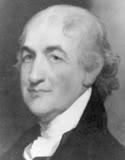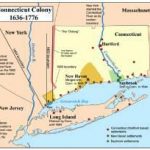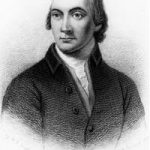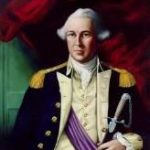Wife of Massachusetts Founding Father Caleb Strong
Sarah Hooker was born on January 30, 1758, in Northampton, Massachusetts, the daughter of Reverend John Hooker and Sarah Worthington Hooker. Caleb Strong was born in Northampton, Massachusetts, on January 9, 1745, the only son of Lt. Caleb Strong and Phebe Lyman Strong. Caleb’s ancestor, the Elder John Strong, who settled in Northampton in 1659, established a tannery and became a leading citizen in the affairs of the town and of the church. The Strong tannery was inherited by Caleb’s father.
Caleb Strong graduated from Harvard College with highest honors in 1764, then studied law with the eminent Judge Joseph Hawley. Strong returned to Northampton and opened a practice in 1772.
From 1774 throughout the American Revolution Strong was a member of Northampton’s Committee of Safety. Committees of Safety were formed to keep watch on the distrusted royal government. Massachusetts took the lead in the appointment of a Committee of Safety in the autumn of 1774, with John Hancock as its first chairman. By 1775 these Committees had become the operating government of all the colonies, as the royal officials were expelled.
Strong began his political career in 1776 when he was elected to the Massachusetts General Court and held the post of county attorney for Hampshire County for 24 years. In 1776 he was also elected to the State House of Representatives. He was a delegate to the 1779 Massachusetts Constitutional Convention and helped write the 1780 state constitution.
Sarah Hooker married Caleb Strong on November 20, 1777. They had eight children, but only five survived to adulthood.
In 1787, Caleb Strong was a delegate to the Constitutional Convention that drafted the U.S. Constitution. Strong was among the delegates who favored a strong central government. Though he preferred a system with the same mode of election to both houses of Congress, he voted in favor of equal representation in the Senate and proportional in the House.
Strong was called home because Sarah was seriously ill and had to leave before the work was completed. Therefore, he missed the signing the of the Constitution, but he took a leading role among the Federalists and campaigned strongly for ratification of the Constitution in Massachusetts.
In 1788 Strong was elected one of the first U.S. Senators from Massachusetts, serving until he resigned in 1796. During the four years he served in that house, he sat on numerous committees and participated in framing the Judiciary Act. Caleb Strong wholeheartedly supported President George Washington and his administration.
While a Senator, Strong incorporated both the Proprietors of Locks and Canals and the Third Massachusetts Turnpike which was chartered to build a road from Northampton to Pittsfield. Sarah’s uncle, John Worthington of Springfield, and her brother John Hooker later became Proprietors of the Locks and Canals.
In 1793 Strong urged the government to send a mission to England and backed the resulting Jay Treaty when it met heated opposition. The Jay Treaty between the United States and Great Britain is credited with averting war and resolving some issues remaining from the American Revolution. The terms of the Treaty were designed primarily by the first Secretary of the Treasury, Alexander Hamilton, strongly supported by the chief negotiator John Jay.
Strong also took an interest in several societies and was president of the Hampshire Missionary Society and the Hampshire Bible Society, was one of the founders of the Academy of Arts and Sciences and was a member of the Massachusetts Historical Society.
Caleb Strong served eleven terms as Governor of Massachusetts. As the Federalist candidate, he defeated Elbridge Gerry in 1800. In his first seven, one-year terms, Governor Strong concentrated on creating a state prison system, restructuring the Commonwealth’s court system, and imposing capital punishment limits. Despite the growing strength of the Democratic party in the state, Strong won reelection annually until 1807.
In 1812 Strong regained the governorship, once again over Gerry, and retained that post until 1816. Strong, along with the governors of Connecticut and Rhode Island, opposed the War of 1812 to the point of refusing to detach a force of 41 companies of Massachusetts militia to Federal service outside of or within his state. An ardent Federalist, he adhered to the states’ rights view that only the governor had the power to call out the state militia, not the national government.
The dispute lasted throughout and even after the war, leading to a certain amount of pettiness and bitterness on both sides of the matter. In brief, as a way of ending the unwanted and harmful war, the states gathered at Hartford would explore collecting and retaining all revenues originating within their borders. The national government could not continue under such circumstances, and Strong anticipated a collision. However the Treaty of Ghent ended the war before the plan moved beyond its initial stage.
Governor Strong declined renomination in 1816, and retired from politics and returned to his law practice in Northampton.
Sarah Hooker Strong died on February 12, 1817, at the age of 59, and was buried at Bridge Street Cemetery in Northampton, Massachusetts.
Caleb Strong died on November 7, 1819, and was also buried at Bridge Street Cemetery. He was eulogized as a man “who has been through the course of a long life alike distinguished for his private virtues and public service, and whose memory a grateful public will ever delight to honor.”
Characterized as a man of integrity, simplicity, and dignity, Strong was greatly beloved by his townspeople who considered him Northampton’s ‘First Citizen.’ He was so much revered by his constituency that not one single vote was cast against him in Northampton and thirty surrounding communities when he was elected Governor for the first time.
SOURCES
Mass.Gov: Caleb Strong
Wikipedia: Caleb Strong
A Biography of Caleb Strong
Historic Northampton: Caleb Strong






